
These are the most sleep-deprived professions
This story originally appeared on Stacker and was produced and distributed in partnership with Stacker Studio.
These are the most sleep-deprived professions
Studies vary on how many hours per sleep we need per day, but the magic number usually hovers around seven. Adults who sleep less than seven hours per day could be susceptible to a wide range of health afflictions including heart disease, depression, and obesity.
Some of the world’s most influential names, from Tim Cook to Michelle Obama, have claimed to rise at or before 4 a.m. each day. For other professionals, the requirements of the job mean long hours working late into the night and following morning. Doctors, farmers, firefighters, and even bookies are taxed with arduous work schedules that easily lead to sleep deprivation. These and other jobs also come with high levels of stress, which can also lead to sleepless nights.
Slumber Yard compiled a list of the jobs where employees encounter the most sleep deprivation. Jobs are ranked by percent of employees with less than seven hours of sleep adjusted to account for sex, race/ethnicity, marital status, age group, and education level. Ties are broken by the smallest confidence interval. Data is from a 2013–2014 study by the CDC, in which 36.5% of all occupation groups averaged under seven hours of sleep.
Some industries have laws to make sure their employees are not overworked (and hopefully are getting enough shut-eye). For example, air traffic controllers and firefighters have mandates that ensure they don’t work more than a certain number of hours in a row. Also, agricultural workers have rights to certain pay standards to offset their taxing workdays.
The COVID-19 pandemic has shone a light on the tough, long hours that many medical professionals, caregivers, and other essential workers experience on a daily basis, with some calling for better wages and more mental health access for these workers in the future.
Read on to see if you have one of the most sleep-deprived professions, and perhaps what can be done to help alleviate your workplace tension.
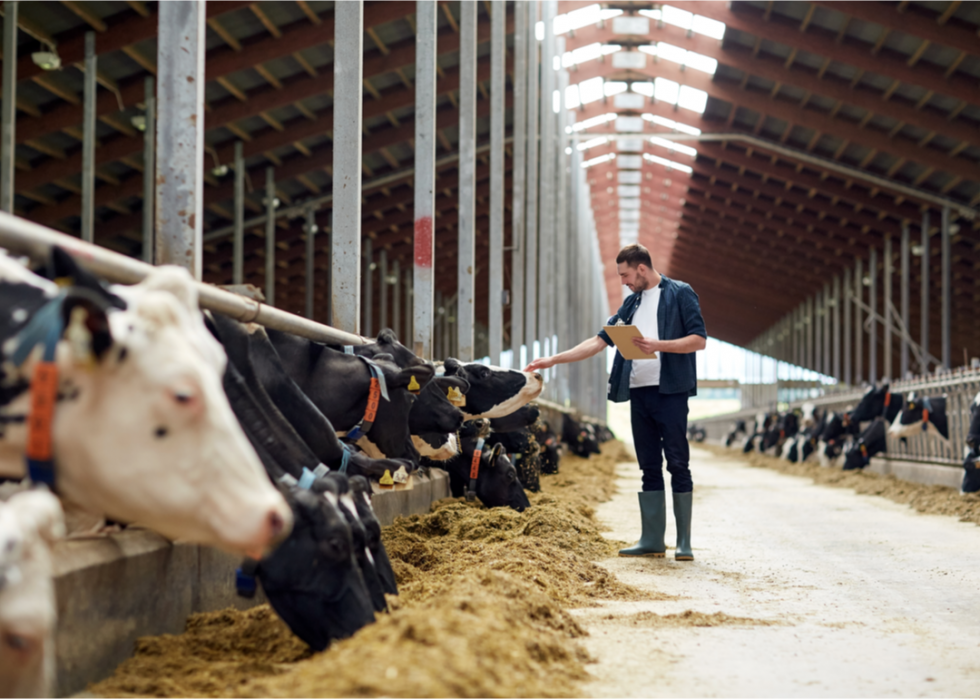
#22. Farming, fishing, and forestry
- Workers with under 7 hours of sleep: 31.3%
- 95% confidence interval: 25.0%–38.4%
- Occupations most sleep-deprived:
--- #1. Fishing and hunting workers: 36.6%
--- #2. Agricultural workers: 30.2%
Workers in the fishing and hunting industry must adapt to extreme weather events and fluctuating temperatures, exceedingly long shifts, and inherent dangers of being out on the water or in the wilderness. Many agricultural workers wake up before the sun rises to begin long hours of manual labor, and there are laws to ensure proper pay standards for their hectic work schedules.

#21. Education, training, and library
- Workers with under 7 hours of sleep: 31.3%
- 95% confidence interval: 29.2%–33.4%
- Occupations most sleep-deprived:
--- #1 (tied). Primary, secondary, and special education school workers: 32.5%
--- #1 (tied). Other education, training, and library occupations: 32.5%
--- #3. Librarians, curators, and archivists: 30.3%
U.S. teachers work an average of 46 hours per week—one of the highest rates in the world, according to a 2019 survey by the National Center for Education Statistics. Among those surveyed, only 36% said their profession felt valued by society. Librarians often encounter burnout from their jobs, and some report stress from interactions with people dealing with traumatic circumstances themselves, from poverty to health emergencies.

#20. Community and social services
- Workers with under 7 hours of sleep: 32.2%
- 95% confidence interval: 27.7%–37.1%
- Occupations most sleep-deprived:
--- #1. Counselors, social workers, and other community and social service specialists: 34.0%
--- #2. Religious workers: 22.4%
Social workers have one of the highest rates of injury and illness of all occupations, according to the BLS. This likely is attributed to the high levels of stress associated with the job. Social workers also routinely have to contend with increased caseloads with diminishing resources available.

#19. Life, physical, and social science
- Workers with under 7 hours of sleep: 33.6%
- 95% confidence interval: 29.7%–37.7%
- Occupations most sleep-deprived:
--- #1. Life, physical, and social science technicians: 41.8%
--- #2. Physical scientists: 32.4%
--- #3. Social scientists and related workers: 32.3%
These scientists can work extensive hours researching in the lab or teaching in the classroom, leading to many hours of work even at home. Ironically, it’s workers in this field who have conducted studies indicating that humans can actually work themselves to death.

#18. Computer and mathematical
- Workers with under 7 hours of sleep: 33.8%
- 95% confidence interval: 31.1%–36.7%
- Occupations most sleep-deprived:
--- #1. Mathematical science occupations: 38.1%
--- #2. Computer specialists: 33.6%
Mathematicians often have to work on tight deadlines; it’s not uncommon to become besieged with last-minute requests for data or analysis. Frequent travel to seminars and conferences is also not out of the norm, resulting in a work schedule that often fluctuates.

#17. Architecture and engineering
- Workers with under 7 hours of sleep: 34.3%
- 95% confidence interval: 31.0%–37.9%
- Occupations most sleep-deprived:
--- #1. Drafters, engineering, and mapping technicians: 40.5%
--- #2. Architects, surveyors, and cartographers: 36.2%
--- #3. Engineers: 32.2%
For some architects, 40-hour workweeks are the minimum and come with no overtime pay. Even before entering the field, some architecture students, stressed by the demands of the industry, contemplated suicide, according to a 2019 report by Dezeen, an architecture and design magazine.

#16. Sales and related
- Workers with under 7 hours of sleep: 34.4%
- 95% confidence interval: 32.6%–36.3%
- Occupations most sleep-deprived:
--- #1. Supervisors, sales workers: 36.0%
--- #2. Sales representatives, services: 35.4%
--- #3. Retail sales workers: 34.4%
Essential workers in retail have been spotlighted during the COVID-19 pandemic, but these hard-working laborers are often underpaid and overworked. Long work hours, holiday workdays, plus arriving early and staying late to assist with stocking and cleanup all cut into sleep hours for those enlisted in sales and related industries.

#15. Legal
- Workers with under 7 hours of sleep: 34.5%
- 95% confidence interval: 30.6%–38.5%
- Occupations most sleep-deprived:
--- #1. Legal support workers: 37.5%
--- #2. Lawyers, judges, and related workers: 32.9%
An old television drama trope is showing a judge or lawyer cramped in their office past sundown, surrounded by scattered papers and perhaps a glass of scotch nearby. But legal workers are indeed some of the most frequent burners of the midnight oil. The New York Times reported in 2019 that public defenders in particular were overworked, with some taking on 194 active cases.
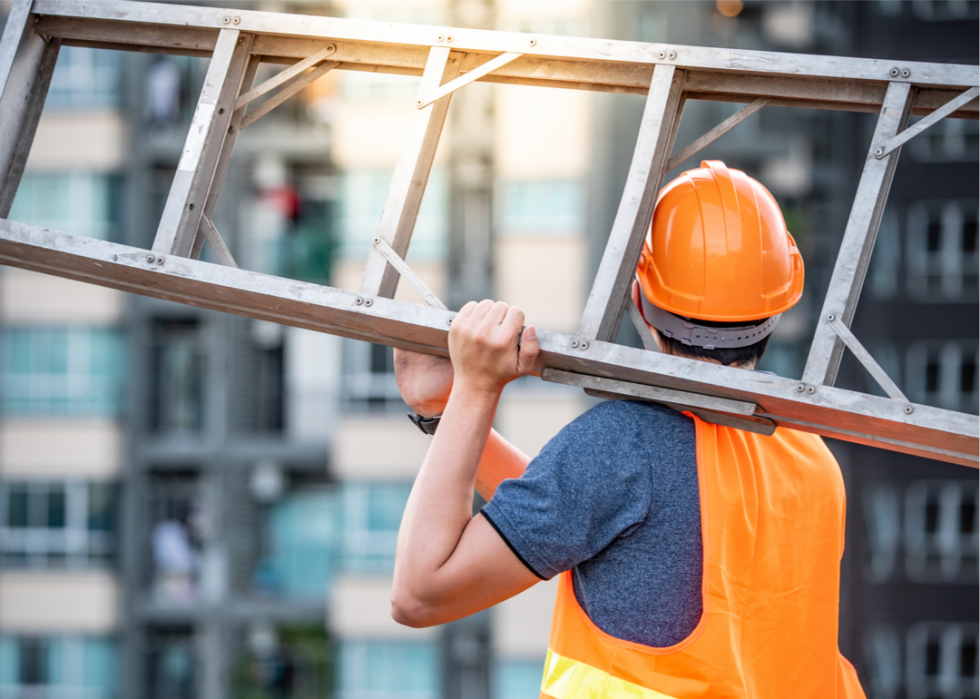
#14. Construction and extraction
- Workers with under 7 hours of sleep: 34.5%
- 95% confidence interval: 32.2%–36.9%
- Occupations most sleep-deprived:
--- #1. Extraction workers: 45.3%
--- #2. Construction trades workers: 34.6%
--- #3. Other construction and related workers: 34.5%
Construction and extraction workers often log long hours (overnight and early in the morning) in a field that is extremely physically demanding. The heightened incidence of injury and illness on the job could also lead to sleep deprivation. The pressure to meet deadlines adds to stress on the job, too.

#13. Management
- Workers with under 7 hours of sleep: 35.4%
- 95% confidence interval: 33.7%–37.2%
- Occupations most sleep-deprived:
--- #1. Chief, executives; general and operations managers; legislators: 36.3%
--- #2. Operations specialties managers: 35.6%
--- #3. Other management occupations: 35.3%
Managers may make good salaries, but their hours committed to work often go above and beyond the standard 40-hour work week. Administrative service managers are expected to be on call at all hours to address problems. Emergency management directors often work evenings and weekends in addition to their regular hours while top executives travel frequently on top of their work-week duties.

#12. Arts, design, entertainment, sports, and media
- Workers with under 7 hours of sleep: 35.5%
- 95% confidence interval: 31.1%–40.2%
- Occupations most sleep-deprived:
--- #1. Art and design workers: 39.0%
--- #2. Entertainers and performers, sports and related workers: 34.8%
--- #3. Media and communication workers: 33.6%
Recent surveys show that creatives are some of the most overworked professionals. Numerous studies have looked at sleep loss among athletes, while entertainers (like those at “Saturday Night Live”) are sometimes notorious for essentially getting through their jobs by sleepwalking.
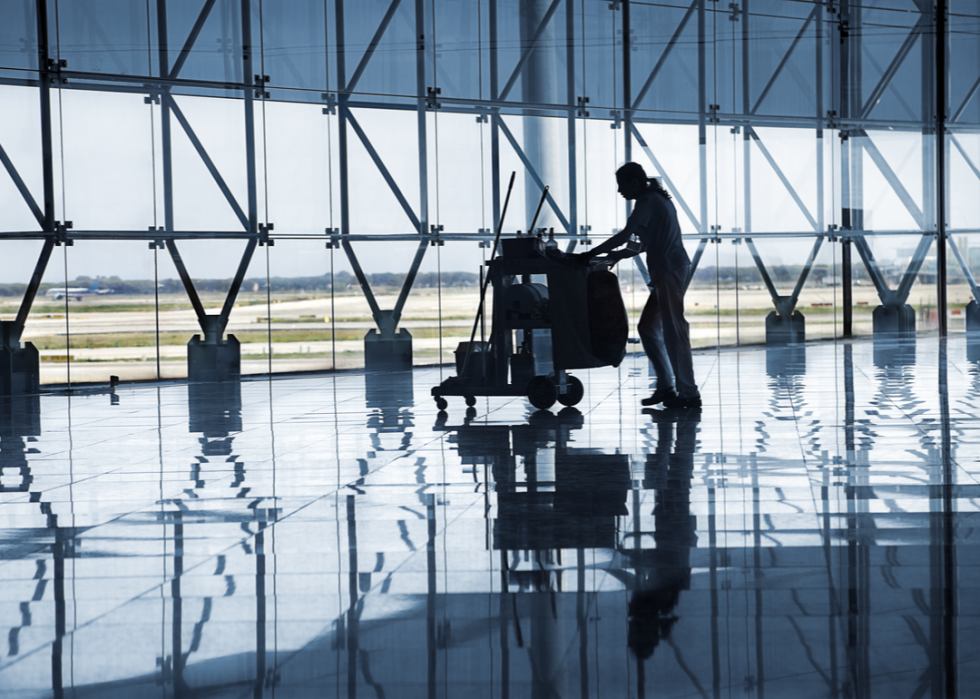
#11. Building and grounds cleaning and maintenance
- Workers with under 7 hours of sleep: 36.0%
- 95% confidence interval: 33.2%–39.0%
- Occupations most sleep-deprived:
--- #1. Supervisors, building and grounds cleaning and maintenance workers: 41.2%
--- #2. Building cleaning and pest control workers: 38.2%
--- #3. Grounds maintenance workers: 28.8%
Grounds crews at major facilities can often work year-round in preparation for big events. Many grounds cleaning and maintenance workers also can be asked to perform extra work depending on weather conditions. Pest control workers are sometimes on-call 24/7, and usually must travel for work.

#10. Business and financial operations
- Workers with under 7 hours of sleep: 36.1%
- 95% confidence interval: 33.3%–39.0%
- Occupations most sleep-deprived:
--- #1 (tied). Business operations specialists: 36.0%
--- #1 (tied). Financial specialists: 36.0%
Business operations specialists earn a mean annual wage of $76,960, but have one of the more laborious occupations in the country. Many specialists work in high-intensity areas like the federal executive branch, state government, and the sciences.

#9. Office and administrative support
- Workers with under 7 hours of sleep: 36.5%
- 95% confidence interval: 34.8%–38.3%
- Occupations most sleep-deprived:
--- #1. Communications equipment operators: 58.2%
--- #2. Material recording, scheduling, dispatching, and distribution workers: 44.6%
--- #3. Other office and administrative support workers: 36.0%
Bookkeepers, accountants, and auditing clerks are among the office and administrative support who work long hours, especially around tax season. Dispatchers also often have long shifts and take calls related to high-pressure situations.

#8. Installation, maintenance, and repair
- Workers with under 7 hours of sleep: 36.6%
- 95% confidence interval: 33.5%–39.8%
- Occupations most sleep-deprived:
--- #1. Other installation, maintenance, and repair occupations: 38.7%
--- #2. Electrical and electronic equipment mechanics, installers, and repairers: 36.6%
--- #3. Vehicle and mobile equipment mechanics, installers, and repairers: 36.0%
Electrical and electronics installers and repairers may lose sleep due to the fact that they spend much of their day working in awkward positions, according to the BLS. In case of emergencies, other repairers and installers are expected to work off-hours and their field has a very high rate of injury and illness. Some installers and repairers, like those working with telecommunications equipment, are on call 24 hours a day.

#7. Personal care and service
- Workers with under 7 hours of sleep: 37.5%
- 95% confidence interval: 34.0%–41.1%
- Occupations most sleep-deprived:
--- #1. Entertainment attendants and related workers: 48.2%
--- #2. Other personal care and service workers: 38.5%
--- #3. Transportation, tourism, and lodging attendants: 36.4%
Sportsbook workers are one example of personal care and service workers who put in long hours, providing nearly round-the-clock entertainment for bettors. Other occupations like childcare workers and personal care aides often work abnormal hours, including throughout the night.
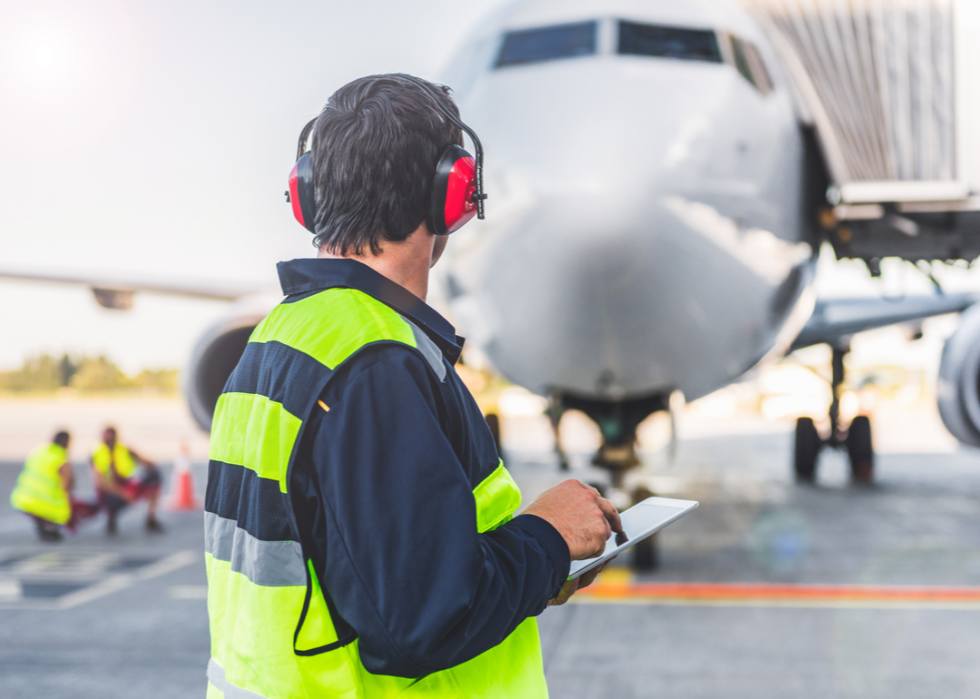
#6. Transportation and material moving
- Workers with under 7 hours of sleep: 39.1%
- 95% confidence interval: 36.6%–41.7%
- Occupations most sleep-deprived:
--- #1. Other transportation workers: 54.0%
--- #2. Rail transportation workers: 52.7%
--- #3. Supervisors, transportation and material moving employees: 43.3%
Because of the frequent running of trains, it’s not uncommon for railroad workers to have a schedule with a mix of days, nights, and weekends. Meanwhile, air-traffic controllers aren’t allowed to work more than 10 hours at a clip and must have nine hours rest between shifts. In New York, similar laws have been enacted to protect taxi drivers.
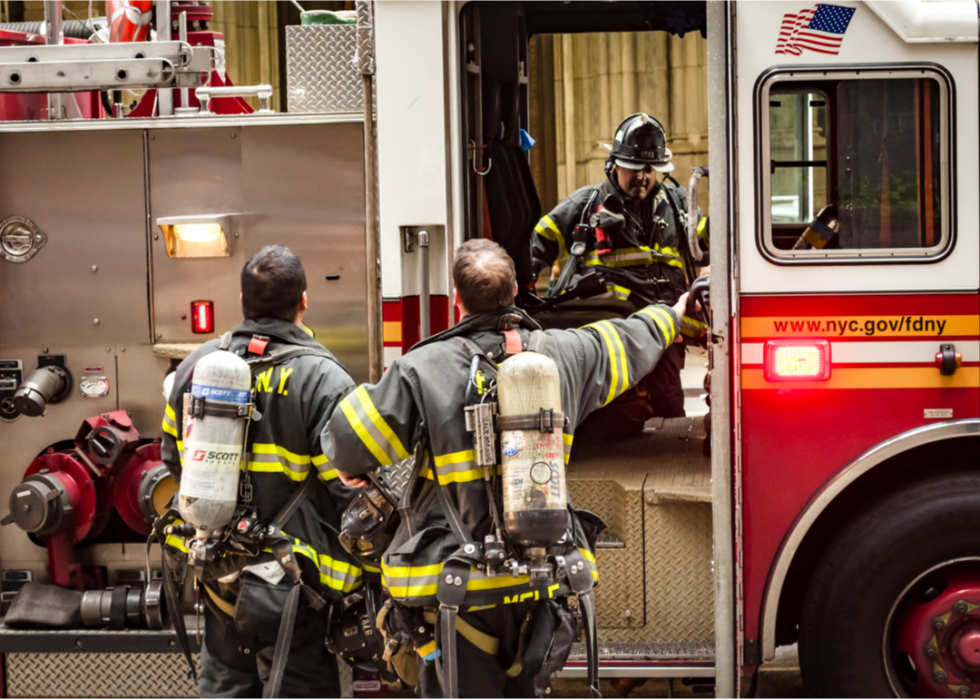
#5. Protective service
- Workers with under 7 hours of sleep: 39.2%
- 95% confidence interval: 35.6%–43.0%
- Occupations most sleep-deprived:
--- #1. Firefighting and prevention workers: 45.8%
--- #2. Law enforcement officers: 39.8%
--- #3. Other protective service workers: 37.7%
Firefighters often work 24-hour shifts on duty, with the next 48 to 72 hours off. That said, hours can be extended in case of major fires such as wildfires. Border patrol agents sometimes work under rough weather conditions, while FBI or Secret Service agents can be called on for extensive travel on short notice.

#4. Food preparation and serving-related
- Workers with under 7 hours of sleep: 39.8%
- 95% confidence interval: 36.6%–43.0%
- Occupations most sleep-deprived:
--- #1. Supervisors, food preparation, and serving workers: 48.9%
--- #2. Cooks and food preparation workers: 41.4%
--- #3. Food and beverage serving workers: 36.1%
The late-night hours of many food establishments lead a number of workers in this field clocking out deep into the night. Some industry workers are calling for their employers to institute more mental health resources to combat the impacts of long and late hours.

#3. Health care practitioners and technical
- Workers with under 7 hours of sleep: 40.0%
- 95% confidence interval: 37.8%–42.2%
- Occupations most sleep-deprived:
--- #1. Health technologists and technicians: 40.4%
--- #2. Health diagnosing and treating practitioners: 39.7%
--- #3. Other health care practitioners and technical occupations: 35.1%
Many health care practitioners are on call 24 hours a day. Before the COVID-19 pandemic, some studies showed physicians can begin to feel fatigued by the mid-afternoon on an average shift. Over the past few months, many health care workers worry about the stress and sleep deprivation faced by colleagues in their field.

#2. Health care support
- Workers with under 7 hours of sleep: 40.1%
- 95% confidence interval: 36.7%–43.5%
- Occupations most sleep-deprived:
--- #1. Nursing, psychiatric, and home health aides: 43.3%
--- #2. Other health care support occupations: 35.7%
--- #3. Occupational and physical therapist assistants and aides: 32.8%
The COVID-19 pandemic has put a spotlight on the arduous duties that health care support workers must fulfill on a daily basis. Home health aides can work long hours overnight with no holidays off, and for minimal pay. With hospitals overflowing and essential workers going above and beyond in their duties to serve infected and at-risk patients, experts fear what kind of mental health toll the pandemic will have on health care support staff.
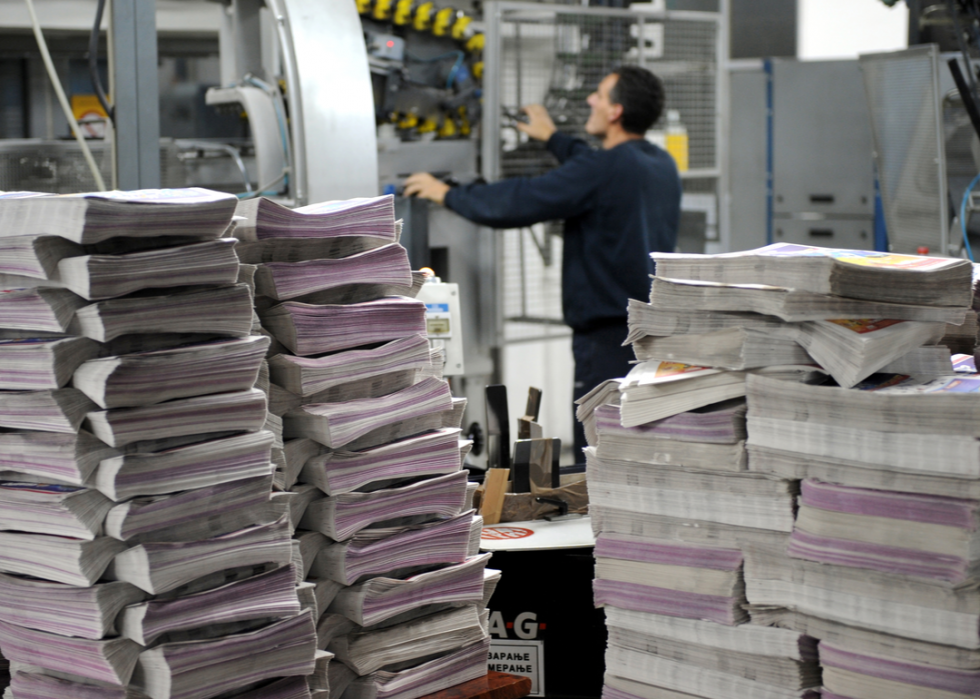
#1. Production
- Workers with under 7 hours of sleep: 42.9%
- 95% confidence interval: 40.3%–45.4%
- Occupations most sleep-deprived:
--- #1. Printing workers: 50.9%
--- #2. Plant and system operators: 49.6%
--- #3. Supervisors, production workers: 48.9%
To get print newspapers and other materials to clients on time, production workers toil for long hours to meet their deadlines. As this 2019 New York Times story details, each night digital pages are sent to a plant to be “burned with lasers onto thin aluminum sheets called plates.” That is the start of an arduous 365-day process of printing the paper and getting it on newsstands before sunrise—that is unless breaking news happens and production workers are ordered to “Stop the presses!” sending the whole process into upheaval.



